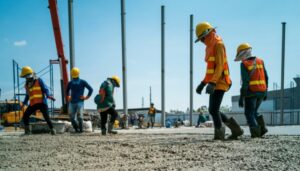A Guide to Choosing the Right Roof for Florida’s Climate
The Sunshine State is renowned for its beautiful weather, but with the tropical climate comes unique challenges, especially when it comes to selecting the right roof for your home or business. In this comprehensive guide, we’ll navigate through the various roofing options suitable for Florida’s climate, ensuring durability and resilience against the intense heat, humidity, and occasional hurricanes. Roof for Florida’s Climate
Introduction
Choosing the right roof for your property is not just a matter of aesthetics; it’s a crucial decision that impacts the longevity and safety of your home. Florida’s climate, characterized by high temperatures, humidity, and the occasional severe weather, demands careful consideration in selecting the appropriate roofing material.
Understanding Florida’s Climate
Florida experiences a tropical climate with high temperatures throughout the year. The combination of heat and humidity, coupled with frequent rain and the occasional hurricane, makes it essential to choose a roof that can withstand these challenging conditions.
Factors to Consider in Roof Selection
Durability
The longevity of your roof is paramount in Florida’s climate. Look for materials that resist wear and tear, such as asphalt shingles, metal, or tile.
Wind Resistance
Given the state’s susceptibility to hurricanes, wind resistance is crucial. Asphalt shingles, known for their durability, are an excellent choice in this regard.
Heat Reflectivity
Opt for materials with high heat reflectivity to keep your home cool. Metal roofing and tile roofs are known for their ability to reflect sunlight, reducing indoor temperatures.
Asphalt Shingles: A Popular Choice
Affordability and Versatility
Asphalt shingles stand out for their affordability and versatility. They come in various styles and colors, allowing homeowners to choose a design that complements their property.
Resistance to High Winds
Florida residents benefit from the wind-resistant nature of asphalt shingles, making them a practical choice in a hurricane-prone region.
Metal Roofing: A Durable Option
Long Lifespan
Metal roofing is renowned for its durability and long lifespan. It can withstand harsh weather conditions, making it an ideal choice for Florida’s unpredictable climate.
Reflective Surface for Energy Efficiency
The reflective surface of metal roofs contributes to energy efficiency, helping to keep homes cooler and reduce energy costs in the long run.
Tile Roofs: Traditional and Stylish
Excellent Heat Resistance
Tile roofs provide excellent heat resistance, making them suitable for Florida’s scorching temperatures. They are also available in various styles, adding a touch of tradition and style to your property.
Aesthetic Appeal
Beyond functionality, tile roofs enhance the visual appeal of homes, blending tradition with a modern touch.
Flat Roofs: Practical for Some Areas
Suitable for Commercial Buildings
Flat roofs are practical for commercial buildings, offering additional usable space. Proper waterproofing is essential to prevent leaks and water damage.
Waterproofing Considerations
Ensuring effective waterproofing is crucial for flat roofs, preventing potential issues associated with heavy rain.
Green Roofing: Eco-Friendly and Cool
Environmental Benefits
Green roofing, with its living vegetation, not only contributes to environmental sustainability but also provides natural insulation, reducing indoor temperatures.
Natural Insulation
The vegetation layer on green roofs acts as natural insulation, promoting energy efficiency and a more comfortable living environment.
Maintenance Requirements
Regular inspections and maintenance are vital for the longevity of any roof. Understanding the specific requirements of your chosen material is essential for effective upkeep.
Tips for Maintaining Different Roof Types
Whether it’s clearing debris from flat roofs or inspecting metal panels for rust, each roofing material has unique maintenance needs. Regular checks and timely repairs can prolong the life of your roof.
Cost Considerations
While the initial cost of installation is a significant factor, it’s essential to consider long-term cost-effectiveness. Investing in a durable and weather-resistant roof may save you money in the long run.
Initial Installation Costs
Evaluate the upfront costs of different roofing materials, considering your budget and long-term financial goals.
Long-Term Cost-Effectiveness
Factor in maintenance and potential repair costs over the lifespan of the roof to determine the overall cost-effectiveness.
Choosing a Reputable Roofing Contractor
The expertise of the roofing contractor is as crucial as the choice of material. Ensure the contractor is well-versed in Florida’s climate and has the necessary certifications.
Importance of Expertise
An experienced roofing contractor understands the nuances of Florida’s climate and can recommend the most suitable materials for your specific needs.
Checking Certifications and References
Verify the contractor’s certifications and seek references to ensure they have a track record of quality work in similar conditions.
Permitting and Building Codes
Adhering to local regulations and building codes is non-negotiable. Ensure your chosen roofing material and design comply with the established standards.
Adherence to Local Regulations
Understanding and adhering to local regulations prevent legal complications and ensure the safety and integrity of your property.
Importance of Obtaining Proper Permits
Securing the necessary permits before beginning construction is a critical step in compliance with building codes.
Warranty and Insurance
Protect your investment by understanding the warranty terms for your chosen roofing material. Additionally, ensure you have proper insurance coverage for potential damages.
Understanding Warranty Terms
Different roofing materials come with varying warranty terms. Familiarize yourself with the specifics to make informed decisions.
Ensuring Proper Insurance Coverage
Confirm that your insurance policy covers potential damages caused by weather events or other unforeseen circumstances.
Common Mistakes to Avoid
Ignoring Climate Considerations
One common mistake is selecting a roof without considering Florida’s unique climate. Each material has its strengths and weaknesses, and it’s essential to align them with the local weather conditions.
Opting for the Cheapest Option without Evaluating Long-Term Costs
While budget considerations are important, solely opting for the cheapest option may result in higher long-term costs due to maintenance and repairs. Strike a balance between upfront expenses and long-term durability.
Conclusion
Choosing the right roof for Florida’s climate is a crucial decision that requires careful consideration of various factors. From understanding the climate to selecting the appropriate material and finding a reputable contractor, each step contributes to the longevity and resilience of your roof. Invest time in the decision-making process to ensure your property is well-protected against the elements.
FAQs
Q: Can I install a flat roof on my residential property in Florida?
A: While flat roofs are more common in commercial buildings, they can be suitable for residential properties with proper waterproofing.
Q: What is the average lifespan of metal roofing in Florida?
A: Metal roofing typically has a lifespan of 40-70 years, making it a durable choice for the state’s climate.
Q: How often should I inspect my roof for maintenance?
A: Regular roof inspections are recommended at least twice a year to catch any issues early and prolong the roof’s lifespan.
Q: Do all roofing materials have the same warranty terms?
A: No, warranty terms vary among different roofing materials, so it’s crucial to understand the specifics for your chosen material.
Q: Is green roofing suitable for all types of buildings?
A: While green roofing offers environmental benefits, it may not be practical for all buildings. Consult with a professional to determine suitability.














